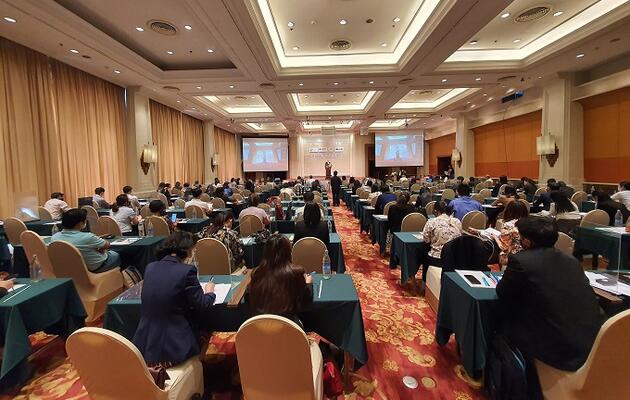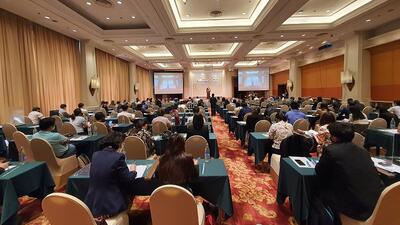
Story: Thailand adapts to new EU regulation on organic production (en)
During a novel workshop on 17 March 2021, Thai stakeholders in the organic sector learned about the challenges and opportunities the new European Union regulation on organic production will bring to the country.
Under the new regulation coming into force in January 2022, products imported in the European Union (EU) may be placed on the market as organic only if they comply with the same set of rules that producers in the European Union have to meet.
Producing to standards considered equivalent only to the established EU regulations is not enough anymore, as Patrick Deboyser, ITC Expert on EU Entry Requirements for Fruits and Vegetables, explained during the training: "This is a move from the principle of equivalence to the principle of conformity. It not only creates a level playing field for all producers, who are obliged to comply with the same set of high standards, but also reassures consumers that organic products sold in the EU, regardless of the place of origin, meet the same high quality standards."
This first workshop under the Arise Plus Thailand project, funded by the EU and implemented by the International Trade Centre in partnership with the Department of Trade Negotiations (DTN), was organized in collaboration with the National bureau of Agriculture Commodity and Food Standards (ACFS) and targeted competent authorities, certification bodies, farmers and business operators in the Thai organic sector.
In his opening remarks, Laurent Lourdais, Counsellor at the Delegation of the European Union to Thailand, explained: "This workshop disseminates correct and up-to-date information on the EU organic market and relevant EU legislation to Thai stakeholders as well as discusses opportunities and challenges for Thai organic exports to the EU market."
Oratai Silapanapaporn, Senior Adviser to the National Bureau of Agriculture Commodity and Food Standards added that the workshop was, "especially relevant as Thailand is currently in the process of revising its national standards on organic production and the EU has just developed a new regulation on organic production. Harmonization to the extent possible is therefore recommended for Thai organic stakeholders to make the most of this new regulation and access the growing European organic market."
Elena Panichi, Head of 'Organics' at the European Commission, said: "The new regulation should ensure fair competition for organic players, while preventing fraud and maintaining consumer trust through several measures. These include simplified production rules, reinforced control systems along the whole value chain, and the need for producers in third countries to comply with the same set of rules as those producing in the EU."
She continued: "The EU imported about 34,000 tonnes of organic products from Thailand in 2020. A rather small volume compared to its total imports of 3.2 million tonnes from third countries. Over 27% of organic products imported to the EU in 2020 were tropical fruit, nuts and spices, with a 13% increase compared to 2019, but only 858 tonnes of the total organic exports of Thailand to the EU belonged to this category. This represents a huge growth potential for Thailand."
To support Thai actors overcome some of the challenges discussed during the workshop, the Arise Plus project will provide technical assistance to officers of the National Bureau of Agriculture Commodity and Food Standards and relevant agencies on international standards for organic products.
It will further support farmers to comply with organic standards and develop an awareness campaign in cooperation with the National Bureau, the relevant departments of the Ministry of Agriculture and Cooperatives (MOAC), the Organic Agriculture Certification (ACT) and the Thai Organic Trade Association (TOTA).
Indeed, having a strong internal market demand is key to ensuring a resilient organic sector, as the COVID-19 crisis has shown.
This activity will be concomitant with efforts undertaken at the ASEAN level to promote trade of organic agricultural products in the region. The aim is to harmonize certification schemes of organic agricultural products in ASEAN, which will allow removing intra-ASEAN trade barriers for certified organic agricultural products.
About the project
The ARISE Plus Thailand project supports sustainable trade growth in the country through promoting a transparent, predictable and competitive business environment, improving the efficiency of public expenditure and service delivery, as well as enhancing organic agriculture practices in Thailand and disseminating them within the Association of South East Asian Nations (ASEAN).
The three-year project is funded by the European Union (EU) and part of its national ARISE Plus projects portfolio to support greater connectivity and economic integration in ASEAN.
The project is implemented jointly with the Government of Thailand, in collaboration with the Ministry of Commerce (MOC), through the Department of Trade Negotiations (DTN). Partners for project implementation include the Office for Trade Competition Commission (OTCC), the Comptroller General Department (CGD), the Ministry of Agriculture and Cooperatives (MOAC), and the National Bureau of Agricultural Commodity and Food Standards (ACFS).




